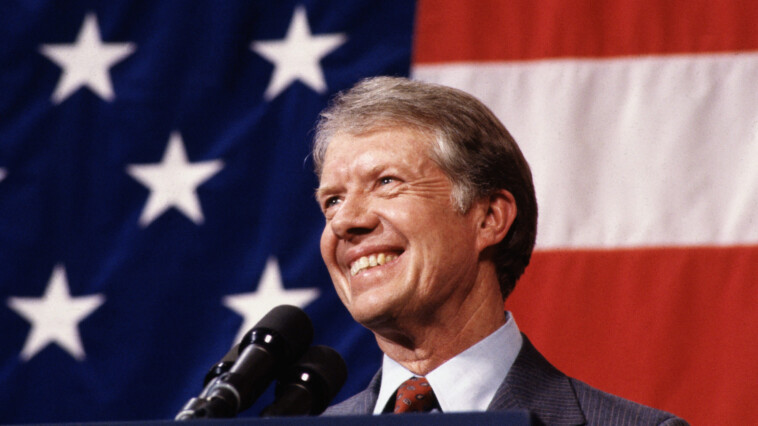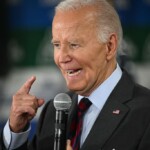Jimmy Carter, the one-time Georgia peanut farmer who rode a post-Watergate, anti-Republican wave to the White House, only to see his troubled presidency usher in the Reagan revolution, has died. He was 100 years old.
Carter’s son confirmed his father’s death in a statement but did not provide an immediate cause of death.
Jimmy Carter, the 39th president of the United States, who may have left an even greater legacy with his efforts in his post-White House years, in which he was awarded the Nobel Peace Prize for his efforts in resolving international conflicts, died Sunday. He was 100.… pic.twitter.com/Ftz1kQyxPu
— Variety (@Variety) December 29, 2024
Carter, a Navy veteran and the oldest living former president, had been diagnosed with cancer in 2021 and in early February moved to hospice care.
Born James Earle Carter, Jr. on October 1, 1924, the 39th U.S. president was the first born in a hospital, and his earliest days were spent on a family farm without electricity or indoor plumbing. Carter’s humble roots and folksy demeanor made him an unlikely political star, first serving as governor of Georgia and then being elected president in 1976 as the country turned on the GOP. But his presidency was marred by runaway inflation, an energy crisis, and the taking of 52 Americans hostage in Iran, a 444-day ordeal that ended the day Reagan was inaugurated.
Although Reagan defeated Carter in 1980 in a 489-electoral vote landslide, Carter’s image with most Americans was that of an honest and religiously devoted man. His approval rating was 70% for the duration of his presidency, according to Gallup, testament that while Americans were frustrated with his performance, they still thought well of him. Carter devoted his lengthy post-presidency to charitable works and liberal activism, teaching Sunday School back in Plains, GA., and authoring more than 30 books, mostly about his life.
Carter first began his studies at Georgia Southwestern College and the Georgia Institute of Technology before graduating from the United States Naval Academy Maryland, in 1946. He married his hometown sweetheart, Rosalynn Smith before departing on a five-year stint with the U.S. Navy around the world.
After the death of his father, Carter left the Navy to take over his family’s farm. While back in Plains, Carter was elected to the local school board, and then to the state senate, before running for Georgia’s governor’s office in 1966. Carter lost the race, battled depression, and became a Born-Again Christian in the Baptist Church.
In 1970, Carter again ran for governor, this time winning and ushering in the era of the “New South” by streamlining bloated state-run agencies. While still in office, and as President Richard Nixon became bogged down in the Watergate scandal, Carter launched a run for the 1976 Democratic presidential nomination.
Carter began his presidential campaign in 1974, releasing his autobiography “Why Not The Best?” which challenged the American people to demand excellence from public servants. According to The New York Times, an initial poll showed Carter was not even in the top potential 31 candidates for the job. Yet, his outsider message ultimately secured the Democratic nomination and victory in the general election over President Gerald Ford, who had finished Nixon’s term.
Although Carter’s presidency is mostly remembered for a moribund economy, the Iranian hostage crisis, and a general malaise in American spirits, he is credited with brokering peace between Israel and Egypt and bringing large swaths of land under federal protection.
Carter and wife Rosalynn became the faces of Habitat for Humanity, the charity that builds homes throughout the U.S. and world for the poor. In 2002, Carter was awarded the Nobel Peace Prize for his decades’ worth of service to others.



